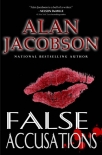False Accusations Jacobson, Alan (books successful people read .TXT) 📖

Book online «False Accusations Jacobson, Alan (books successful people read .TXT) 📖». Author Jacobson, Alan
He stopped in front of the jury box, rested his hands on the railing. Looked at each of them, making eye contact as he spoke. “Mr. Warwick, in his opening, said that he didn’t need to prove anything to you—which is good for him, because he didn’t prove anything. Because he couldn’t.” Denton leaned forward. “But we did. We proved our case, met our burden of proof. You must tell everyone in this great nation that murder for revenge will not go unpunished. Ladies and gentlemen, do your duty. Find the defendant guilty, as charged. Thank you.”
A low-level murmur erupted from the gallery; the reporters were writing furiously, phone sat the ready. As soon as Warwick finished his statement, the journalists covering the trial for radio would call in and report live, while those handling it for television would choose an appropriate backdrop for filming their remote spot. Bloggers and local print journalists would begin transmitting their bytes from their laptops, tablets, and smartphones within seconds.
Calvino cracked his gavel and asked for quiet. He nodded to Warwick. The lanky public defender stood, buttoned his sport coat, and approached the jury box. He stopped, and smiled. “Good morning. Ladies and gentlemen of the jury, as you have surmised, we have now reached that part of the case known as closing argument in which each of the lawyers has an opportunity to tell you what his case is about. You’ve already heard the district attorney’s position.
“In my opening, I told you that the evidence that the prosecution had against my client was circumstantial. Not the best type of evidence. In fact, none of it is direct evidence. Because there is no direct evidence linking my client to this crime. No one saw her commit the crime.
“Oh, yeah, there’s a witness who saw someone wearing a Cubs cap. Well, the last time I looked, being a Cubs fan did not make someone a murderer. And we also must remember that based upon this same witness’s description, the police arrested a male initially, not a female.
“My client is not an angel. She’s not a model citizen. I won’t insult your intelligence by standing up here and saying that she is. But her past actions were not precursors to murder. Poor judgment, misguided ethics, for sure. But murder?” He spread his arms out, palms up, pleading his case. “I think not. I know not.”
“And this incident in the market. My client has what some call ‘verbal diarrhea.’ She runs off at the mouth,” he clarified, to some stifled laughter. “But again, I ask you...does this make her a murderer? It does not. She was angry, she was frustrated—whether you feel she was right or justified is irrelevant. But when she came face-to-face with the man who represented her frustrations, she yelled something at him. Did she really mean what she said? Of course not. We all, at one time or another, say things that we regret, that we don’t mean. We’ve all said things that we wish we could, take back because they were said in the heat of the moment. The DA wants you to believe that she was announcing to a crowded market her intentions to commit murder. My client may not be an angel, but she is certainly not stupid.
“At the start of this trial, I asked you to remember three things: reasonable doubt, circumstantial evidence, and burden of proof. Burden of proof,” Warwick said, walking the length of the jury box and letting his left hand drag along the railing, “means that it is the prosecution’s responsibility to make a compelling case against my client. But all they did was to throw a bunch of circumstances at you and ask you to make a leap of faith. They gave you nothing concrete except a contrived theory.
“They didn’t mean for their case to be so indirect and weak—it’s not their fault. They didn’t have a choice. But ask yourselves,” he said, slapping his right hand, karate-chop style, into his left palm for emphasis, “did they actually prove anything to you, or did they merely set the stage and ask you to imagine that you’ve seen the play?
“You have to admit that their case may, in, fact, be interesting, but it’s not conclusive. Certainly not beyond a reasonable doubt. Which is the standard against which, you must judge my client. Reasonable doubt means that if you have any doubts about the innocence or guilt of my client, if there’s something bothering you about all of this in the back of your mind, something that just doesn’t feel right, you must vote not guilty. That’s not my invention, it’s the law.
“As for Mr. Denton thinking that the matter of imprisoning someone for perhaps the rest of her life is a simple decision...well, maybe where he comes from, it is. From where you and I come from, it is not. It’s never easy to make such drastic decisions regarding another human being’s life. I’m sure you feel that in order to do so, you must be absolutely sure of the facts. Absolutely sure!”
As Warwick’s voice rose, in the manner that a preacher admonishes his followers, Denton detected the slight nod of the head of two of the jurors.
“I’m not asking you for sympathy for my client. But I am asking you for fairness for my client. Miss Harding is an innocent person, falsely accused, whose life will never be the same again, even if she is acquitted. Don’t reach a verdict of guilty merely





Comments (0)